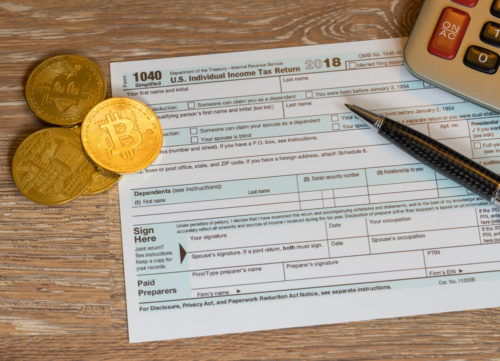Investing in cryptocurrency can yield significant returns, though it can also expose you to risk. If you earn profits when investing in cryptocurrencies such as Bitcoin, Etherium, or Ripple, you will need to report your earnings for tax purposes.
The same is true if you accept cryptocurrency as a form of payment from an employer, client, or customer.
Reporting cryptocurrency on your taxes may seem confusing because it is so different than other forms of currency and other investment vehicles. However, the IRS is aware of the use of Bitcoin and its peers. Failing to report crypto earnings can lead to an audit, penalties, or even legal issues and jail sentences. The best policy, then, is to keep accurate records and learn how to report your earnings to the IRS.
Table of Contents
Cryptocurrency Tax Laws
The IRS has released a statement about cryptocurrency that says they treat cryptocurrency as property: “For federal tax purposes, virtual currency is treated as property. General tax principles applicable to property transactions apply to transactions using virtual currency.“
Though the IRS Bitcoin policy has evolved, the agency has clear steps that crypto holders need to take to report and pay taxes on their holdings and earnings. Many Bitcoin investors do not pay, and the agency is cracking down on people who do not report capital gains from crypto investments.
When Should You Pay Taxes?
You can use cryptocurrency in several different ways. Here are some examples of cryptocurrency transactions you need to report to the IRS on your tax returns:
- If you buy and hold cryptocurrency, the IRS wants you to report it as an asset.
- If you receive cryptocurrency payments for goods or services, you need to include it on your tax returns. The IRS wants you to report the fair market value of the crypto at the time of the transaction. That would mean the exchange rate between the cryptocurrency and the U.S. dollar.
- If you mine Bitcoin or another cryptocurrency, you earn small miners’ fees. You need to report these profits. However, you can also track expenses such as electricity and mining hardware and report them as business expenses.
- If you trade cryptocurrencies on an exchange, you need to list your profits as capital gains. Some traders use technical and fundamental analysis to buy crypto coins and then sell them at a higher price when the market changes.
- If you settle payments on behalf of a vendor, you also need to report any profits that you make through fees or commissions.
Penalties for Failing to Pay Taxes
The IRS has sent notices to tax filers, reminding them to report cryptocurrency earnings and making them aware of the penalties for willingly not doing so. If you get convicted of filing a false claim or tax evasion, your fines could reach up to $250,000. You could also receive a prison sentence. Tax evasion carries a maximum five-year sentence, and filing a false claim can get you as much as a three-year jail term.
IRS Cracking Down on Crypto Investors
The IRS sent out a letter in 2019 reminding some taxpayers that they not only need to include cryptocurrency on their tax returns but that they may need to amend past returns to include crypto profits.
A related statement by IRS Commissioner Chuck Rettig explained that the agency is focusing on cryptocurrency, while also reaching out to taxpayers to help them understand this new currency. “The IRS is expanding our efforts involving virtual currency, including increased use of data analytics. We are focused on enforcing the law and helping taxpayers fully understand and meet their obligations.”
How to Report Cryptocurrency on Taxes
If you have proper recordkeeping practices, choose the correct IRS forms, and perform some basic accounting, you will be able to report your cryptocurrency earnings accurately on your tax returns.
Recordkeeping Basics
Established and regulated exchanges may offer a history of all your trades, but you should track your bitcoin investments independently. Technically, you can withdraw your currency from one exchange and sell it on another if you prefer. When investing or trading, you need to report the difference in value between the time you bought the currency and the time you sold it or its value at the end of the year.
For example, in early 2019, one bitcoin was worth $3,700. In late December of that year, the price hit $7,000. If you sold your bitcoin at $7,000, you would need to declare the difference ($3,300) as profit on your tax returns. You would need a record of the purchase and sale.
An exchange would give you a receipt or summary of the transactions which you could print or save as a PDF. This record could be important if the IRS decides to audit you. You would then have a paper trail that showed your cryptocurrency transactions. You can find current and historical prices on bitcoin-USD on the internet.
You would save the same evidence for other types of cryptocurrency transactions, such as receiving payments for services or products in Bitcoin.
Calculating Capital Gains and Losses
Capital gains are the profits that you realize from the sale of an asset. Capital gains are the difference between the purchase and sale price of an asset. These gains can come from any investment vehicles, including stocks, bonds, and cryptocurrency.
There are two types of capital gains: short term and long term. Short-term gains are gains from assets that you hold for less than one year. These gains have the same tax rate as regular income, so the rate at which they get taxed depends on your tax bracket. You realize long-term gains by holding an asset for longer than 12 months before selling it. Depending on your tax bracket, long term capital gains get taxed as 0%, 15%, or 20%.
Essential IRS Forms
You record your profits from cryptocurrency on Form 1040. You complete and attach additional forms depending on your cryptocurrency activities. You then transfer the information to your 1040 and attach these forms to your tax return.
- Form 8594 is where you list the sale and purchase of assets. You also use this form to record the fair market value for your cryptocurrency.
- Form 8949 is where you list capital gains and losses from trading activity. You use this form to record the purchase and sale prices of your cryptocurrency and calculate capital gains (or losses) from each sale.
Resources for Cryptocurrency Taxation
These resources will help you with your tax returns if you have profited from crypto activities:
Best Crypto Tax Software
- BearTax provides record-keeping features that allow users to track and record transactions across different cryptocurrency platforms and exchanges. These records can help you calculate capital gains and provide a paper trail in case you get audited. Bear Tax costs $1 per year for less than 20 crypto transactions, and $30 to $200 depending on the number of transactions.
- CoinTracker likewise helps you create reports and records. You connect to the exchanges where you trade. CoinTracker also works with cryptocurrency wallets, so you can track trading activity that occurs outside of exchanges. Coin Tracker costs between $49 (for hobbyists) and $499 (for up to 5,000 transactions per year).
- CryptoTrader.Tax is from Coin Ledger. It allows you to import transaction history from wallets and exchanges and create reports that you can use to complete your taxes. Prices are between $49 and $299.
- TokenTax uses experienced certified public accountants to help you connect to exchanges so that you can collect trading data in one place. You can also access all the forms that you need to file your taxes. Service starts at $65 for cryptocurrency-only service and $499 for full tax returns.
Further Information
- The IRS Bitcoin and cryptocurrency presentation from the Nationwide Tax Forum includes general information about cryptocurrency. The document also has specific tax information about cryptocurrency and related laws.
- The IRS has a frequently-asked questions page with answers to specific questions about cryptocurrency. You can learn tax rules for calculating capital gains and how to record an exchange between cryptocurrency and U.S. dollars.
- Investing.com has a page with real-time prices for major cryptocurrencies. You can choose the fiat currency in which you wish to get a quote. The U.S. dollar is the default currency for users with American internet protocol addresses.
Image Source: https://depositphotos.com/





